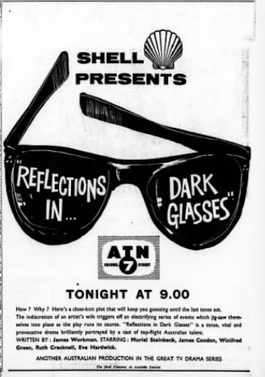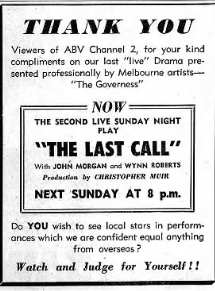Related Research Articles
Norman James Kaye was an Australian actor. He was best known for his roles in the films of director Paul Cox.

Stormy Petrel is an early Australian television drama. A period drama, the 12-episode serial told the story of William Bligh and aired in 1960 on ABC. It was the first live TV serial from the ABC.

Blue Murder is an Australian live television play which aired in 1959 on ABC. Broadcast live in Sydney on 2 December 1959, a kinescope ("telerecording") was made of the broadcast so it could be shown in Melbourne.

"Reflections in Dark Glasses" is an Australian television film, or rather a television play, which aired in 1960. It aired as part of Shell Presents, which consisted of monthly presentations of stand-alone television dramas. It was written by Sydney writer James Workman, and is notable as an early example of Australian-written television drama. It was broadcast live in Sydney on 6 February 1960, then recorded and shown in Melbourne.

Close to the Roof is a 1960 Australian live television play which aired on ABC. Broadcast 14 December 1960 in Sydney, it was kinescoped ("telerecorded") and shown in Melbourne on 25 January 1961. Australian TV drama was relatively rare at the time.

Boy Round the Corner is an Australian film which aired in 1962. Broadcast live on ABC, it was set in Sydney but produced in Melbourne. Australian TV drama was relatively rare at the time.
Australian Playhouse was an Australian anthology TV series featuring the work of Australian writers.
Traveller Without Luggage is a 1961 Australian television film directed by Henri Safran and starring Ric Hutton. It was Safran's first English language work.

Last Call is a 1958 Australian TV play set in a South American country. It was directed by Christopher Muir.
Christopher Muir was an Australian director and producer, notable for his work in TV in the 1950s and 1960s. In the 1980s he was head of ABC Television drama.
Eye of the Night is a 1960 Australian television play. It was written by Kay Keavney and directed by Christopher Muir.

Six Characters in Search of an Author is a 1963 television play broadcast by the Australian Broadcasting Corporation. It was directed by Christopher Muir. It is a production of the play by Luigi Pirandello.

Martine is a 1961 Australian television play directed by Christopher Muir in Melbourne.
Who Killed Kovali? is a 1960 Australian television play. It had previously been filmed for British TV in 1957.
The End Begins is a 1961 Australian television play shot in ABC's Melbourne studios. Like many early Australian TV plays it was based on an overseas script. It was a rare Australian TV play with a science fiction theme and a black lead actor, although no recordings are thought to have survived.

You Can't Win 'Em All is a 1962 Australian television play directed by Patrick Barton. Filmed in London, it was based on a play by Alun Owen which had been previously filmed by the BBC in 1962.
The Road is a 1963 British television play by Nigel Kneale. It was broadcast as part of the BBC Television anthology drama series First Night. An Australian remake was aired the following year. No recordings of the production on either video or audio are known to exist. The script for The Road was published alongside those for Kneale's teleplays The Year of the Sex Olympics and The Stone Tape under the title The Year of the Sex Olympics and Other TV Plays in 1976.
Quiet Night is a 1941 Australian play by Dorothy Blewett.
The Slaughter of St. Teresa's Day was a 1960 Australian TV play based on the 1959 stage play of the same name by Peter Kenna.
Dorothy Blewett (1898–1965) was an Australian writer and literary agent. She also wrote as Anne Praize or Ann Praize. Several of her plays were adapted for TV. She lived for a time in England.
References
- ↑ Vagg, Stephen (27 August 2022). "3 Forgotten Australian Television Plays". Filmink.
- ↑ "Stage Play Competition". The Sydney Morning Herald . No. 34, 312. New South Wales, Australia. 11 December 1947. p. 16. Retrieved 15 February 2019– via National Library of Australia.
- ↑ "Behind! The Mike". Truth . No. 3025. New South Wales, Australia. 11 January 1948. p. 29. Retrieved 15 February 2019– via National Library of Australia.
- ↑ "STARS OF THE AIR. FILM ACTRESS FOR A.B.C." The Muswellbrook Chronicle . Vol. 28, no. 3. New South Wales, Australia. 16 January 1948. p. 2. Retrieved 15 February 2019– via National Library of Australia.
- 1 2 "Family Drama In New Prize Play". The Sydney Morning Herald . No. 34, 391. New South Wales, Australia. 13 March 1948. p. 9. Retrieved 15 February 2019– via National Library of Australia.
- 1 2 "Australian Period Piece". The Bulletin. 69 (3553): 18. 17 March 1948. Retrieved 7 June 2019.
- ↑ "TV Guide". The Age. 16 February 1961. p. 33.
- ↑ "TV Guide". The Age. 3 March 1961. p. 8.
- ↑ Vagg, Stephen (18 February 2019). "60 Australian TV Plays of the 1950s & '60s". Filmink.
- 1 2 Vagg, Stephen (27 August 2022). "3 Forgotten Australian Television Plays". Filmink.
- ↑ "Clothes for All TV Occasions". The Age. 19 January 1961. p. 2.
- ↑ "Playwright Insists on 'The Truth'". The Age TV supplement. 16 February 1961. p. 2.
- ↑ "CHARACTER CONFLICT IN ABN PLAY". Sydney Morning Herald. 1 May 1961. p. 9.
- ↑ "Leading Character in TV Drama". The Age. 24 November 1960. p. 18.
- ↑ "TV Drama Producer in Search for New Faces". The Age. 10 November 1960. p. 16.
- ↑ "Play on television". Sydney Morning Herald. 4 May 1961. p. 5.